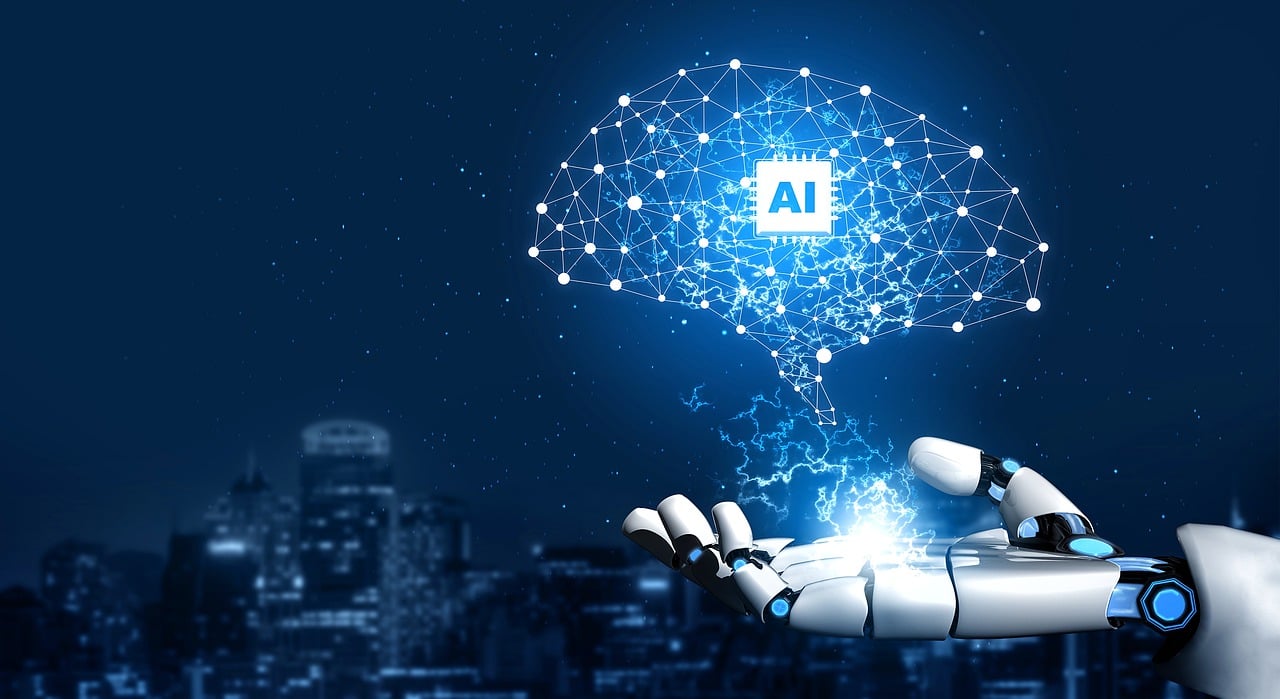Streamlining Operations with Robotic Process Automation (RPA)
Robotic Process Automation (RPA) stands out as a key player in revolutionizing operational efficiency for businesses. By automating repetitive and rule-based tasks, RPA not only reduces human error but also allows employees to focus on more complex, strategic activities. For instance, routine data entry, invoice processing, and customer service inquiries can be seamlessly handled by RPA, freeing up valuable time and resources. According to a McKinsey report, RPA can lead to a 20-30% cost reduction in various business processes, making it a compelling choice for organizations seeking to optimize their operations.
Unlocking Business Intelligence with Machine Learning (ML)
Machine Learning (ML) takes the spotlight when it comes to extracting meaningful insights from vast datasets. ML algorithms can analyze patterns and trends, providing businesses with actionable intelligence to make informed decisions. In sales and marketing, predictive analytics powered by ML can forecast customer behavior, enabling targeted campaigns and personalized experiences. Moreover, ML algorithms can enhance cybersecurity measures by detecting anomalies and potential threats in real-time. As businesses increasingly rely on data-driven strategies, ML becomes an indispensable tool for staying competitive in the market.
Enhancing Customer Engagement through Natural Language Processing (NLP)
In the realm of customer engagement, Natural Language Processing (NLP) emerges as a game-changer. NLP enables machines to understand, interpret, and generate human-like language, revolutionizing communication between businesses and their customers. Chatbots, powered by NLP, can provide instant and personalized responses to customer queries, significantly improving user experience. According to a study by Juniper Research, businesses adopting NLP-driven applications could save over $8 billion annually by 2022. As customer expectations continue to evolve, NLP ensures that businesses stay agile and responsive in their interactions.
Revolutionizing Decision-Making with Predictive Analytics
Predictive analytics, another facet of artificial intelligence, empowers businesses to anticipate future trends and outcomes based on historical data. By leveraging advanced statistical algorithms and machine learning models, predictive analytics aids in forecasting customer behavior, market trends, and even potential risks. Businesses can optimize their strategies, allocate resources more effectively, and make proactive decisions to stay ahead of the curve. According to a survey by Deloitte, organizations that embrace predictive analytics are twice as likely to be in the top quartile of financial performance within their industries.
Personalizing Experiences with AI-driven Marketing
In the era of digital marketing, delivering personalized experiences to customers is paramount. AI-driven marketing solutions utilize machine learning algorithms to analyze customer preferences, behaviors, and interactions. This data is then used to create targeted and personalized marketing campaigns, enhancing customer engagement and loyalty. According to a report by Evergage, 88% of marketers have reported measurable improvements in their business from implementing AI-driven personalization. From recommending products based on past purchases to tailoring content to individual preferences, AI-driven marketing transforms generic interactions into meaningful and relevant experiences.
Ensuring Data Security with AI-Powered Cybersecurity
In an era where data breaches and cyber threats loom large, businesses are turning to AI-powered cybersecurity solutions to fortify their digital defenses. Machine learning algorithms can detect unusual patterns and behaviors, identifying potential security risks before they escalate. These advanced systems provide real-time threat intelligence, enabling organizations to respond swiftly to emerging cyber threats. According to a study by Accenture, AI in cybersecurity has the potential to prevent 87% of breaches, showcasing its instrumental role in safeguarding sensitive data and maintaining the trust of customers.
Optimizing the Supply Chain with AI
The complexities of modern supply chains demand intelligent solutions, and AI is rising to the challenge. From demand forecasting and inventory management to logistics optimization, AI enhances efficiency and reduces costs throughout the supply chain. By analyzing historical data and external factors in real-time, AI algorithms can make accurate predictions, ensuring that businesses maintain optimal inventory levels and streamline the logistics process. A report by McKinsey estimates that AI in the supply chain can lead to a 20-50% reduction in supply chain costs, making it a pivotal tool for organizations aiming to enhance their competitiveness and responsiveness.
Revolutionizing Human Resources with AI
Human Resources (HR) departments are undergoing a transformation with the integration of AI. AI-powered tools can streamline recruitment processes by analyzing resumes, identifying suitable candidates, and even conducting initial interviews. This not only saves time but also ensures a more unbiased and data-driven approach to hiring. Additionally, AI in HR assists in employee engagement and retention by analyzing workforce data to identify trends and potential areas for improvement. As per a study by IBM, companies using AI in HR reported a 39% reduction in turnover rates, demonstrating the significant impact of AI on talent management.
Improving Healthcare Outcomes through AI
In the healthcare sector, AI is playing a pivotal role in improving patient outcomes and operational efficiency. Machine learning algorithms can analyze medical data to assist in diagnosing diseases, predicting patient risks, and personalizing treatment plans. AI applications range from virtual health assistants to predictive analytics for disease outbreaks. According to a report by Frost & Sullivan, AI in healthcare is projected to save up to $150 billion annually for the U.S. healthcare economy by 2026. The integration of AI not only enhances medical decision-making but also ensures more accessible and personalized healthcare services.
The expansive reach of artificial intelligence into various sectors of business underscores its versatility and transformative potential. From optimizing supply chains and fortifying cybersecurity to revolutionizing HR processes and improving healthcare outcomes, AI is reshaping the way organizations operate. The adoption of AI is no longer a question of if, but rather a matter of when and how strategically. As businesses continue to navigate the complexities of the digital age, those embracing AI will find themselves at the forefront of innovation and competitiveness. The synergy between human ingenuity and artificial intelligence is creating a new paradigm for success, where organizations can leverage the power of AI to achieve unprecedented levels of efficiency, insight, and resilience. The journey into the AI-driven future is dynamic, and for businesses ready to embrace it, the possibilities are boundless.
Frequently Asked Questions (FAQs) about Artificial Intelligence in Business:
Q1: What is the significance of AI in the business sector? A1: Artificial Intelligence in the business sector holds immense significance as it enables organizations to streamline operations, enhance decision-making, and stay competitive in the digital era. AI technologies such as machine learning, robotic process automation, and natural language processing contribute to increased efficiency, innovation, and overall business success.
Q2: How can Robotic Process Automation (RPA) benefit businesses? A2: RPA can benefit businesses by automating repetitive and rule-based tasks, reducing human error, and allowing employees to focus on more strategic activities. It leads to cost reduction, improved accuracy, and increased operational efficiency. According to McKinsey, organizations can achieve a 20-30% cost reduction in various processes through RPA.
Q3: What role does AI play in customer engagement? A3: Natural Language Processing (NLP) within AI is instrumental in revolutionizing customer engagement. It enables machines to understand and generate human-like language, improving interactions through applications like chatbots. Businesses adopting NLP-driven applications can save significant costs and enhance customer experiences, according to studies.
Q4: How does AI contribute to data security? A4: AI-powered cybersecurity solutions use machine learning algorithms to detect unusual patterns and behaviors, providing real-time threat intelligence. By preventing and mitigating cyber threats, AI plays a crucial role in ensuring data security and maintaining customer trust.
Q5: What impact does AI have on HR processes? A5: AI transforms Human Resources by automating recruitment processes, analyzing workforce data for better decision-making, and improving employee engagement. Companies using AI in HR have reported reduced turnover rates, showcasing its positive impact on talent management.
Q6: Can AI improve healthcare outcomes? A6: Yes, AI has a significant impact on healthcare by assisting in disease diagnosis, predicting patient risks, and personalizing treatment plans. According to Frost & Sullivan, AI in healthcare is projected to save billions annually, leading to improved patient outcomes and more accessible healthcare services.
Q7: How does AI contribute to supply chain optimization? A7: AI optimizes the supply chain by utilizing predictive analytics and machine learning to forecast demand, manage inventory, and streamline logistics. McKinsey estimates a 20-50% reduction in supply chain costs through the implementation of AI, making it crucial for organizations aiming to enhance competitiveness.
Q8: Is AI a necessity for businesses in the modern era? A8: The integration of AI is increasingly becoming a strategic imperative for businesses seeking to thrive in the modern era. It goes beyond being an option; it is a necessity for those aiming to stay competitive, innovative, and resilient in the ever-evolving business landscape




